Amazon Smart Search is a browser hijacker, which is promoted via other free downloads, and once installed it will add the Amazon Toolbar, change your browser homepage to amazon.com/websearch, and set your default search engine to Amazon Smart Search.
![Amazon Smart Search homepage [Image: Amazon Smart Search homepage]](http://malwaretips.com/blogs/wp-content/uploads/2013/11/amazon-smart-search.jpg)
Amazon Smart Search it’s technically not a virus, but it does exhibit plenty of malicious traits, such as rootkit capabilities to hook deep into the operating system, browser hijacking, and in general just interfering with the user experience. The industry generally refers to it as a “PUP,” or potentially unwanted program.
- How to remove Amazon Smart Search (Virus Removal Guide)
- STEP 1 : Remove Amazon Smart Search from Internet Explorer, Firefox and Chrome
- STEP 2: Remove Amazon Smart Search browser hijacker with AdwCleaner
- STEP 3: Remove Amazon Smart Search virus from with Malwarebytes Anti-Malware Free
- STEP 4: Double-check for the Amazon Smart Search infection with HitmanPro
Amazon Smart Search got on your computer after you have installed a freeware software (video recording/streaming, download-managers or PDF creators) that had bundled into their installation this browser hijacker. This browser hijacker is also bundled within the custom installer on many download sites (examples: CNET, Brothersoft or Softonic), so if you have downloaded a software from these websites, chances are that Amazon Smart Search was installed during the software setup process.
Very often users have no idea where did it come from, so it’s not surprising at all that most of them assume that Amazon Smart Search is a virus.
For example, when you install DivX Player, you will also agree to change your browser homepage to amazon.com/websearch, set your default search engine to Amazon Smart Search, and install the Amazon Toolbar.
![Amazon Smart Search redirect [Image: Amazon Smart Search redirect]](http://malwaretips.com/blogs/wp-content/uploads/2013/11/amazon-smart-search-redirect.jpg)
However when you uninstall DivX Player from your computer, your web browser’s default settings will not be restored. This means that you’ll have to remove Amazon Smart Search and Amazon Toolbar from your favorite web browser manually.
You should always pay attention when installing software because often, a software installer includes optional installs, such as this Amazon Smart Search browser hijacker. Be very careful what you agree to install.
Always opt for the custom installation and deselect anything that is not familiar, especially optional software that you never wanted to download and install in the first place. It goes without saying that you should not install software that you don’t trust.
How to remove Amazon Smart Search (Virus Removal Guide)
This page is a comprehensive guide, which will remove Amazon Smart Search from Internet Explorer, Firefox and Google Chrome.
Please perform all the steps in the correct order. If you have any questions or doubt at any point, STOP and ask for our assistance.
STEP 1: Remove Amazon Smart Search from Internet Explorer, Firefox and Chrome
STEP 2: Remove Amazon Smart Search browser hijacker with AdwCleaner
STEP 3: Remove Amazon Smart Search virus with Malwarebytes Anti-Malware Free
STEP 4: Double-check for the Amazon Smart Search infection with HitmanPro
STEP 1 : Remove Amazon Smart Search from Internet Explorer, Firefox and Chrome
Remove Amazon Smart Search from Internet Explorer
- Open Internet Explorer, click on the gear icon
![Remove Amazon Smart Search (Virus Removal Guide) 2 [Image: icongear.jpg]](//malwaretips.com/images/removalguide/icongear.jpg) (Tools for Windows XP users) at the top (far right), then click again on Internet Options.
(Tools for Windows XP users) at the top (far right), then click again on Internet Options.
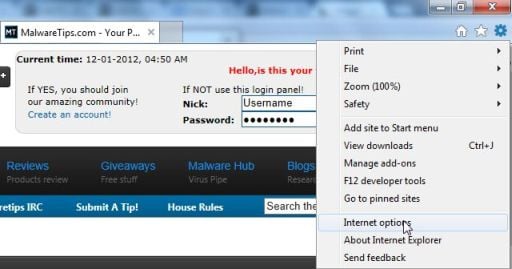
- In the Internet Options dialog box, click on the Advanced tab, then click on the Reset button.
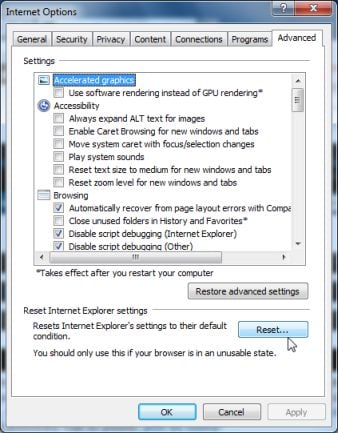
- In the Reset Internet Explorer settings section, check the Delete personal settings box, then click on Reset.
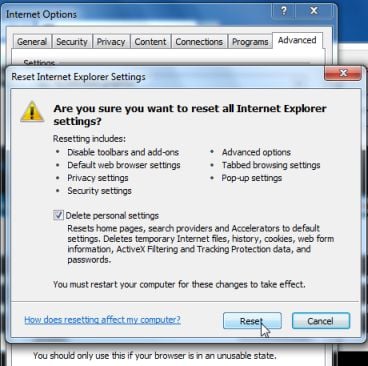
- When Internet Explorer finishes resetting, click Close in the confirmation dialogue box and then click OK.
- Close and open Internet Explorer.
Remove Amazon Smart Search from Mozilla Firefox
- Remove Amazon Smart Search extensions from Firefox.
At the top of the Firefox window, click the orange Firefox button, then select Add-ons.

Select the Extensions tab, then remove Amazon Browser Bar and any other unknown extensions from Mozilla Firefox.
![Amazon Smart Search Firefox extension [Image: Amazon Smart Search Firefox extension]](//malwaretips.com/blogs/wp-content/uploads/2013/11/amazon-smart-search-Firefox-extensions.jpg)
- Reset your default search engine and homepage from Amazon Smart Search to their default.
To reset your search engine and homepage to their default, we will use the SearchReset extension.This add-on is very simple: on installation, it backs up and then resets your search preferences and home page to their default values, and then uninstalls itself. This affects the search bar, URL bar searches, and the home page.
You can download SearchReset from the below link, and then we will just need to install it to revert Firefox to its default settings.
SEARCHRESET DOWNLOAD LINK (This link will open another web page from where you can download the SearchReset Firefox extension)
![Install SearchReset extension to restore Firefox to its default settings [Image: SearchReset extension]](//malwaretips.com/blogs/wp-content/uploads/2013/03/searchreset-firefox-extension.jpg)
Remove Amazon Smart Search from Google Chrome
- Remove Amazon Smart Search extensions from Google Chrome.
Click the Chrome menu button on the browser toolbar, select Tools and then click on Extensions.
button on the browser toolbar, select Tools and then click on Extensions.
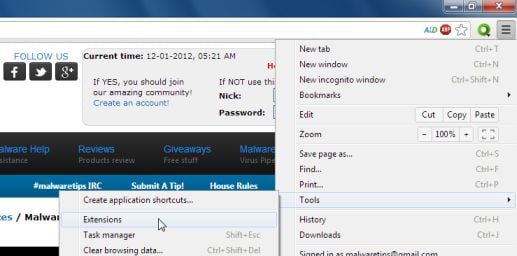
In the Extensions tab, remove Amazon 1Button App for Chrome and any other unknown extensions by clicking the trash can![Remove an extension from Chrome [Image: Remove an extension from Chrome]](//malwaretips.com/blogs/wp-content/uploads/2013/07/Trash-Can-Chrome.png) icon.
icon.
Basically, if you have not installed an extension, you should remove it from your web browser.
![Amazon Smart Search Chrome extension [Image: Amazon Smart Search Chrome extension]](//malwaretips.com/blogs/wp-content/uploads/2013/11/amazon-smart-search-Chrome-extensions.jpg)
- Set Google Chrome default search engine from Amazon Smart Search to Google.
Click the Chrome menu button, then select Settings and click on Manage search engines in the Search section.
button, then select Settings and click on Manage search engines in the Search section.
In the Search Engines dialog that appears, select Google and click the Make Default button that appears in the row.
![Amazon Smart Search Chrome redirect [Image: Amazon Smart Search Chrome redirect]](//malwaretips.com/blogs/wp-content/uploads/2013/11/amazon-smart-search-Chrome-redirect.jpg)
Search for Amazon Smart Search (amazon.com/websearch) in the Search Engines list, and click the X button that appears at the end of the row.
![Amazon Smart Search Chrome removal [Image: Amazon Smart Search Chrome removal]](//malwaretips.com/blogs/wp-content/uploads/2013/11/amazon-smart-search-Chrome-removal.jpg)
- Change Google Chrome homepage from Amazon Smart Search to its default.
Amazon has modified your Google Chrome settings to open their webpage whenever you start your browser, so we will need to revert this change.
Click the Chrome menu button, then select Settings and click on One the New Tab page in the On Startup section.
button, then select Settings and click on One the New Tab page in the On Startup section.
![Change Google Chrome homepage to its default [Image: Change Google Chrome homepage to its default]](//malwaretips.com/blogs/wp-content/uploads/2013/06/Chrome-default-page.jpg)
STEP 2: Remove Amazon Smart Search browser hijacker with AdwCleaner
- You can download AdwCleaner utility from the below link.
ADWCLEANER DOWNLOAD LINK (This link will automatically download AdwCleaner on your computer) - Before starting AdwCleaner, close all open programs and internet browsers, then double-click on the AdwCleaner icon.
![AdwCleaner Icon [Image: AdwCleaner Icon]](//malwaretips.com/blogs/wp-content/uploads/2013/08/adwcleaner-icon.jpg)
If Windows prompts you as to whether or not you wish to run AdwCleaner, please allow it to run. - When the AdwCleaner program will open, click on the Scan button as shown below.
![Click on Scan button to search for Amazon Smart Search infection [Image: Adwcleaner Scan]](//malwaretips.com/blogs/wp-content/uploads/2013/08/adwcleaner-scan.jpg)
AdwCleaner will now start to search for Amazon Smart Search malicious files that may be installed on your computer. - To remove the Amazon Smart Search malicious files that were detected in the previous step, please click on the Clean button.
![Click on the Clean button to remove Amazon Smart Search [Image: AdwCleaner removing infections]](//malwaretips.com/blogs/wp-content/uploads/2013/08/adwcleaner-cleanup.jpg)
AdwCleaner will now prompt you to save any open files or data as the program will need to reboot the computer. Please do so and then click on the OK button.
STEP 3: Remove Amazon Smart Search virus from with Malwarebytes Anti-Malware Free
Malwarebytes Anti-Malware Free utilizes Malwarebytes powerful technology to detect and remove all traces of malware including worms, trojans, rootkits, rogues, dialers, spyware and more.
- You can download Malwarebytes Anti-Malware Free from the below link, then double-click on the icon named mbam-setup.exe to install this program.
MALWAREBYTES ANTI-MALWARE DOWNLOAD LINK(This link will open a download page in a new window from where you can download Malwarebytes Anti-Malware Free) - When the installation begins, keep following the prompts in order to continue with the setup process, then at the last screen click on the Finish button.
![Malwarebytes Anti-Malware installation screen [Image: Malwarebytes Anti-Malware final installation screen]](//malwaretips.com/blogs/wp-content/uploads/2013/01/malwarebytes-installation.jpg)
- On the Scanner tab, select Perform quick scan, and then click on the Scan button to start searching for the Amazon Smart Search malicious files.
![Run a Quick Scan with Malwarebytes Anti-Malware [Image: Malwarebytes Anti-Malware Quick Scan]](//malwaretips.com/blogs/wp-content/uploads/2013/01/malwarebytes-quick-scan.jpg)
- Malwarebytes’ Anti-Malware will now start scanning your computer for Amazon Smart Search as shown below.
![Malwarebytes Anti-Malware scanning for Amazon Smart Search [Image: Malwarebytes Anti-Malware scanning for Amazon Smart Search virus]](//malwaretips.com/blogs/wp-content/uploads/2013/01/malwarebytes-scan.jpg)
- When the Malwarebytes Anti-Malware scan has finished, click on the Show Results button.
![Malwarebytes when the system scan has completed [Image: Malwarebytes Anti-Malware scan results]](//malwaretips.com/blogs/wp-content/uploads/2013/01/malwarebytes-scan-results.jpg)
- You will now be presented with a screen showing you the computer infections that Malwarebytes Anti-Malware has detected. Make sure that everything is Checked (ticked), then click on the Remove Selected button.
![Malwarebytes Anti-Malwar removing Amazon Smart Search [Image: Malwarebytes Anti-Malware removing Amazon Smart Search]](//malwaretips.com/blogs/wp-content/uploads/2013/01/malwarebytes-virus-removal.jpg)
STEP 4: Double-check for the Amazon Smart Search infection with HitmanPro
HitmanPro is a second opinion scanner, designed to rescue your computer from malware (viruses, trojans, rootkits, etc.) that have infected your computer despite all the security measures you have taken (such as anti virus software, firewalls, etc.).
- You can download HitmanPro from the below link:
HITMANPRO DOWNLOAD LINK (This link will open a web page from where you can download HitmanPro) - Double-click on the file named HitmanPro.exe (for 32-bit versions of Windows) or HitmanPro_x64.exe (for 64-bit versions of Windows). When the program starts you will be presented with the start screen as shown below.
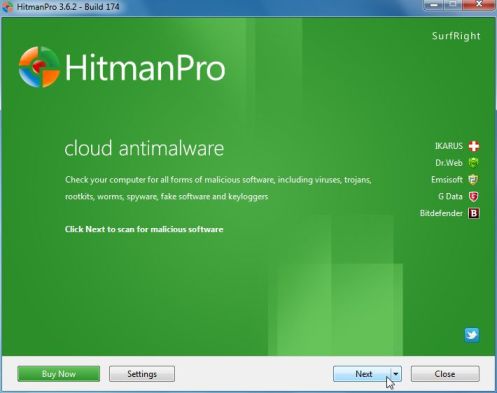
Click on the Next button, to install HitmanPro on your computer.
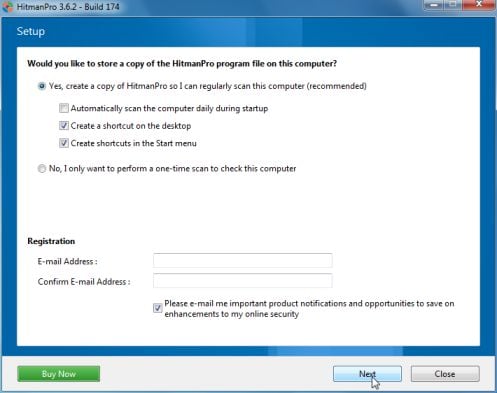
- HitmanPro will now begin to scan your computer for Amazon Smart Search malicious files.
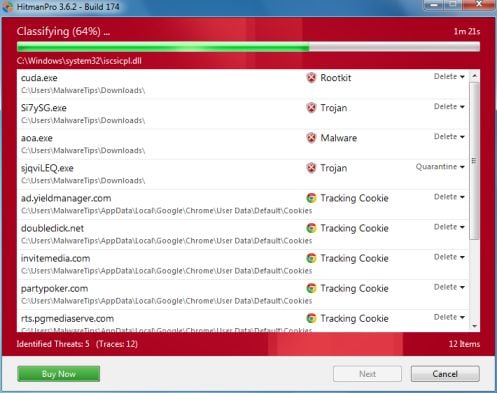
- When it has finished it will display a list of all the malware that the program found as shown in the image below. Click on the Next button, to remove Amazon Smart Search adware.
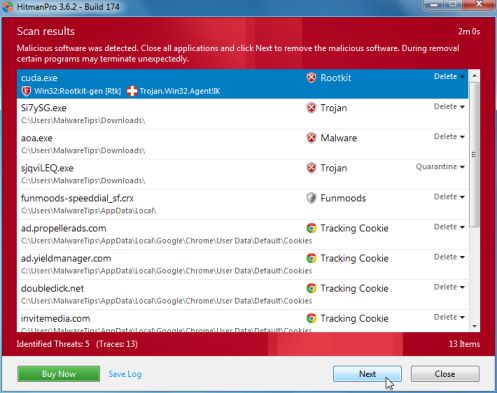
- Click on the Activate free license button to begin the free 30 days trial, and remove all the malicious files from your computer.
![HitmanPro free 30 days trial [Image: HitmanPro 30 days activation button]](//malwaretips.com/blogs/wp-content/uploads/2012/11/hitmanpro-activation.jpg)
Your computer should now be free of the Amazon Smart Search infection. If your current anti-virus solution let this infection through, you may want to consider purchasing the PRO version of Malwarebytes Anti-Malware to protect against these types of threats in the future, and perform regular computer scans with HitmanPro.
If you are still experiencing problems while trying to remove Amazon Smart Search from your machine, please start a new thread in our Malware Removal Assistance forum.

![Remove Amazon Smart Search (Virus Removal Guide) 1 [Image: Amazon Smart Search homepage]](https://malwaretips.com/blogs/wp-content/uploads/2013/11/amazon-smart-search.jpg)




![Amazon Smart Search Firefox extension [Image: Amazon Smart Search Firefox extension]](http://malwaretips.com/blogs/wp-content/uploads/2013/11/amazon-smart-search-Firefox-extensions.jpg)
![Install SearchReset extension to restore Firefox to its default settings [Image: SearchReset extension]](http://malwaretips.com/blogs/wp-content/uploads/2013/03/searchreset-firefox-extension.jpg)

![Amazon Smart Search Chrome extension [Image: Amazon Smart Search Chrome extension]](http://malwaretips.com/blogs/wp-content/uploads/2013/11/amazon-smart-search-Chrome-extensions.jpg)
![Amazon Smart Search Chrome redirect [Image: Amazon Smart Search Chrome redirect]](http://malwaretips.com/blogs/wp-content/uploads/2013/11/amazon-smart-search-Chrome-redirect.jpg)
![Amazon Smart Search Chrome removal [Image: Amazon Smart Search Chrome removal]](http://malwaretips.com/blogs/wp-content/uploads/2013/11/amazon-smart-search-Chrome-removal.jpg)
![Change Google Chrome homepage to its default [Image: Change Google Chrome homepage to its default]](http://malwaretips.com/blogs/wp-content/uploads/2013/06/Chrome-default-page.jpg)
![Click on Scan button to search for Amazon Smart Search infection [Image: Adwcleaner Scan]](http://malwaretips.com/blogs/wp-content/uploads/2013/08/adwcleaner-scan.jpg)
![Click on the Clean button to remove Amazon Smart Search [Image: AdwCleaner removing infections]](http://malwaretips.com/blogs/wp-content/uploads/2013/08/adwcleaner-cleanup.jpg)
![Malwarebytes Anti-Malware installation screen [Image: Malwarebytes Anti-Malware final installation screen]](http://malwaretips.com/blogs/wp-content/uploads/2013/01/malwarebytes-installation.jpg)
![Run a Quick Scan with Malwarebytes Anti-Malware [Image: Malwarebytes Anti-Malware Quick Scan]](http://malwaretips.com/blogs/wp-content/uploads/2013/01/malwarebytes-quick-scan.jpg)
![Malwarebytes Anti-Malware scanning for Amazon Smart Search [Image: Malwarebytes Anti-Malware scanning for Amazon Smart Search virus]](http://malwaretips.com/blogs/wp-content/uploads/2013/01/malwarebytes-scan.jpg)
![Malwarebytes when the system scan has completed [Image: Malwarebytes Anti-Malware scan results]](http://malwaretips.com/blogs/wp-content/uploads/2013/01/malwarebytes-scan-results.jpg)
![Malwarebytes Anti-Malwar removing Amazon Smart Search [Image: Malwarebytes Anti-Malware removing Amazon Smart Search]](http://malwaretips.com/blogs/wp-content/uploads/2013/01/malwarebytes-virus-removal.jpg)




![HitmanPro free 30 days trial [Image: HitmanPro 30 days activation button]](http://malwaretips.com/blogs/wp-content/uploads/2012/11/hitmanpro-activation.jpg)

